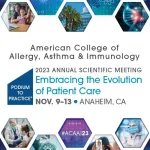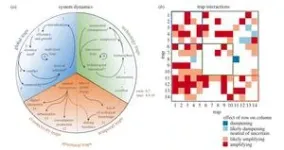(Press-News.org) ANAHEIM, Calif. (November 12, 2023) – Allergist Gailen Marshall, MD, PhD, of Jackson, MS, was installed as president of the American College of Allergy, Asthma and Immunology (ACAAI) at the ACAAI Annual Scientific Meeting on November 12 in Anaheim, Calif. Allergist James Tracy, DO, of Omaha, NE, was elected ACAAI president-elect.
Other newly elected ACAAI officers are Cherie Zachary, MD, Eagan, MN as vice president and Kelly Maples, MD, Norfolk, VA as treasurer. Regents elected for three-year terms include Aikaterini Anagnostou, MD, MSc, PhD, Houston, Texas, Brian T. Kelly, MD, MA, Omaha, Nebraska and Mervat Nassef, MD, New York, New York.
Dr. Gailen Marshall serves as the R. Faser Triplett, Sr., MD, Chair of Allergy and Immunology, Professor of Medicine, Pediatrics and Pathology, Vice Chair for Research, Director of the Division of Clinical Immunology and Allergy and Chief of the Laboratory of Behavioral Immunology Research at University of Mississippi Medical Center (UMMC). He has been at UMMC in Jackson since 2004.
Dr. Marshall earned both a PhD in Immunology (1979) and his MD (1984) from the University of Texas Medical Branch in Galveston. He did internal medicine training at the University of Iowa and completed his residency, chief residency and allergy-immunology fellowship at the University of Tennessee at Memphis.
Dr. Marshall served the publication mission for the College for 21 years. He was a member of the Annals of Allergy, Asthma and Immunology (Annals) editorial board from 2000-04 and a member of the editorial board for AllergyWatch from 2002-05. He was appointed associate editor of the Annals in 2005 and became editor-in-chief (EIC) in 2006. He served as editor-in-chief through 2021. Dr. Marshall received the ACAAI Distinguished Service award and was recognized as a Distinguished Fellow of the College in 2009.
Dr. James Tracy is a board-certified allergist and immunologist in Omaha, Nebraska. A graduate of the University of New England College of Osteopathic Medicine in 1984 and has been practicing Allergy and Immunology for 33 years. He completed his fellowship in Allergy and Immunology at Wilford Hall US Air Force Medical Center.
Dr. Tracy currently is partner with Allergy, Asthma & Immunology Associates of Omaha, Nebraska, and has academic appointments at the University of Nebraska and Creighton University. He helps manage 19 outreach clinics throughout Nebraska.
Dr. Tracy has served on the ACAAI Advocacy Council, the Annual Meeting Program Committee, the Board of Regents, the Budget/Finance Committee, the Ethics Committee, and the ACAAI Foundation Board. Dr. Tracy was recognized as a Distinguished Fellow of the College in 2019. He received the Bela Schick Lecture and Distinguished Service award in 2020.
Dr. Tracy earned a spot on the Omaha Best Doctors list in 2018, 2019 and 2020, as selected by his healthcare industry peers.
For more information about allergies and asthma, or to find an allergist in your area, visit AllergyandAsthmaRelief.org. The ACAAI Annual Scientific Meeting is Nov. 9-13. For more news and research from the ACAAI Scientific Meeting, go to our newsroom and follow the conversation on X/Twitter #ACAAI23.
About ACAAI
The American College of Allergy, Asthma & Immunology (ACAAI) is a professional medical organization of more than 6,000 allergists-immunologists and allied health professionals, headquartered in Arlington Heights, Ill. Founded in 1942, the College fosters a culture of collaboration and congeniality in which its members work together and with others toward the common goals of patient care, education, advocacy, and research. ACAAI allergists are board-certified physicians trained to diagnose allergies and asthma, administer immunotherapy, and provide patients with the best treatment outcomes. For more information and to find relief, visit AllergyandAsthmaRelief.org. Join us on Facebook, Pinterest, Instagram and X/Twitter.
END
Gailen Marshall installed as ACAAI President
James Tracy is president-elect
2023-11-12
ELSE PRESS RELEASES FROM THIS DATE:
Decline in estimated glomerular filtration rate after dapagliflozin in heart failure with mildly reduced or preserved ejection fraction
2023-11-12
About The Study: Among patients with heart failure with mildly reduced ejection fraction or heart failure with preserved ejection fraction treated with dapagliflozin in this randomized clinical trial, an initial estimated glomerular filtration rate (eGFR) decline was frequent but not associated with subsequent risk of cardiovascular or kidney events. These data reinforce clinical guidance that sodium-glucose cotransporter-2 inhibitors should not be interrupted or discontinued in response to an initial eGFR decline.
Authors: Finnian R. Mc Causland, ...
2023 Joseph A. Johnson Award goes to Yale University professor of physics
2023-11-12
AIP and the National Society of Black Physicists congratulate Charles D. Brown II as the winner of the 2023 Joseph A. Johnson Award for Excellence. Dante O’Hara and Danielle Speller are also being recognized with Honorable Mentions.
The Johnson Award, now in its fourth year, is given by AIP and NSBP to recognize early-career scientists who demonstrate scientific ingenuity and impactful mentorship and service – the core values of NSBP founder Joseph A. Johnson.
“We are excited to recognize Dr. Brown’s impact on the physics community,” said Michael Moloney, CEO of AIP. ...
A high-risk antiphospholipid antibody profile matters in pediatric patients with antiphospholipid syndrome
2023-11-12
San Diego, CA, November 12, 2023 - A new study by Hospital for Special Surgery (HSS) investigators has found that an initial high-risk antibody profile for antiphospholipid syndrome (APS) tended to remain high in pediatric patients. The results were presented today in a poster session at American College of Rheumatology (ACR) Convergence 2023, the ACR’s annual meeting.1
“There are a lot of unanswered questions about how APS affects pediatric patients since evidence to date has been very limited,” said Jheel Pandya, MD, a pediatric rheumatology fellow at HSS and lead author of the research. “Our study reveals that an initial high-risk ...
Hormonal contraceptives in teens may alter risk assessment
2023-11-12
[Embargoed until 1 p.m. (ET) Sunday, Nov. 12]
WASHINGTON – Hormonal contraceptives taken by adolescents may influence development of the brain in a way that alters the recognition of risks, a new study in rats suggests.
Scientists at The Ohio State University are exploring how common synthetic hormones used for birth control affect the prefrontal cortex, an area of the brain that continues to develop throughout adolescence.
The researchers found that myelination, the formation of protective coating on axons projecting from the main body of brain cells, increased in rats given hormonal birth control compared to untreated rats, while the number ...
Early-life stress changes more genes in brain than a head injury
2023-11-12
WASHINGTON – A surprising thing happened when researchers began exploring whether early-life stress compounds the effects of a childhood head injury on health and behavior later in life: In an animal study, stress changed the activation level of many more genes in the brain than were changed by a bump to the head.
It’s already known that head injuries are common in young kids, especially from falling, and can be linked to mood disorders and social difficulties that emerge later in life. Adverse childhood experiences are also very ...
Summer wildfire and winter air pollution and particulates linked to different risks of heart attack and severe chest pain, new study finds
2023-11-12
Short-term increases in air pollution can cause problems for a lot of people, but especially to those with diagnosed or undiagnosed heart disease. But it’s not just a potential issue for pollution coming from cars and industrial processes.
New research from Intermountain Health in Salt Lake City shows that pollutants trapped in lower, colder layers of air in mountain-region communities present sometimes higher risk for this population, while wildfire smoke from often distant locales may also impact risk.
“We’re finding that air pollution is affecting ...
New study finds current dosing recommendations may not help patients achieve optimal vitamin D levels
2023-11-12
Low levels of Vitamin D have been shown to be associated with a higher risk of having a cardiac event, like a heart attack or stroke. For this reason, treatment by Vitamin D pills or injections are being investigated as a possible preventative method in these patients.
However, two new studies from Intermountain Health in Salt Lake City have found that current dosing recommendations are not helping patients achieve optimal Vitamin D levels, suggesting that trials looking into the effectiveness of Vitamin D treatment to prevent cardiac events were not using appropriately sufficient doses, leading to inaccurate results.
In their studies, Intermountain ...
Study finds poor ventilation use during CPR for out-of-hospital cardiac arrest
2023-11-12
The ventilation technique, also known as rescue breathing, commonly used during cardiopulmonary resuscitation (CPR) for people with cardiac arrest is often performed poorly by professional emergency responders, and this ineffective strategy is linked to significantly worse patient survival rates, according to a study supported by the National Institutes of Health. Ventilation involves administering breaths to a patient to provide life-sustaining oxygen and inflate the lungs when they stop breathing or during cardiac arrest, when the heart suddenly stops pumping blood. Among the nearly 2,000 ...
Blood thinner apixaban prevents strokes in patients with device-detected atrial fibrillation
2023-11-12
The widely available blood thinner apixaban substantially reduced stroke in at-risk patients with a type of atrial fibrillation only detectable by a pacemaker or other implanted cardiac electronic device, a global study has found.
The oral anticoagulant medication, which helps to prevent dangerous blood clots by thinning the blood, reduced the risk of stroke and blood clotting by 37% and reduced fatal or disabling stroke by 49% in individuals with device-detected atrial fibrillation, also known as sub-clinical atrial ...
New study finds genetic testing can effectively identify patients with family history of high cholesterol to prevent heart attack, stroke, and death
2023-11-12
Familial hypercholesteremia (FH) is an inherited condition that affects about 1 in 250 people, and often shows no signs until they have a heart attack. For individuals with FH the lowering of “bad” cholesterol levels can’t be done by dietary or behavioral changes, the problem is in their genes, and targeted medications therapy is needed.
Now, new research from the Intermountain Health in Salt Lake City has found that genetic screening can identify these patients and make them candidates for treatment that could prevent heart attack, stroke, and death.
“Most of these patients already had tests that ...
LAST 30 PRESS RELEASES:
ASU researchers to lead AAAS panel on water insecurity in the United States
ASU professor Anne Stone to present at AAAS Conference in Phoenix on ancient origins of modern disease
Proposals for exploring viruses and skin as the next experimental quantum frontiers share US$30,000 science award
ASU researchers showcase scalable tech solutions for older adults living alone with cognitive decline at AAAS 2026
Scientists identify smooth regional trends in fruit fly survival strategies
Antipathy toward snakes? Your parents likely talked you into that at an early age
Sylvester Cancer Tip Sheet for Feb. 2026
Online exposure to medical misinformation concentrated among older adults
Telehealth improves access to genetic services for adult survivors of childhood cancers
Outdated mortality benchmarks risk missing early signs of famine and delay recognizing mass starvation
Newly discovered bacterium converts carbon dioxide into chemicals using electricity
Flipping and reversing mini-proteins could improve disease treatment
Scientists reveal major hidden source of atmospheric nitrogen pollution in fragile lake basin
Biochar emerges as a powerful tool for soil carbon neutrality and climate mitigation
Tiny cell messengers show big promise for safer protein and gene delivery
AMS releases statement regarding the decision to rescind EPA’s 2009 Endangerment Finding
Parents’ alcohol and drug use influences their children’s consumption, research shows
Modular assembly of chiral nitrogen-bridged rings achieved by palladium-catalyzed diastereoselective and enantioselective cascade cyclization reactions
Promoting civic engagement
AMS Science Preview: Hurricane slowdown, school snow days
Deforestation in the Amazon raises the surface temperature by 3 °C during the dry season
Model more accurately maps the impact of frost on corn crops
How did humans develop sharp vision? Lab-grown retinas show likely answer
Sour grapes? Taste, experience of sour foods depends on individual consumer
At AAAS, professor Krystal Tsosie argues the future of science must be Indigenous-led
From the lab to the living room: Decoding Parkinson’s patients movements in the real world
Research advances in porous materials, as highlighted in the 2025 Nobel Prize in Chemistry
Sally C. Morton, executive vice president of ASU Knowledge Enterprise, presents a bold and practical framework for moving research from discovery to real-world impact
Biochemical parameters in patients with diabetic nephropathy versus individuals with diabetes alone, non-diabetic nephropathy, and healthy controls
Muscular strength and mortality in women ages 63 to 99
[Press-News.org] Gailen Marshall installed as ACAAI PresidentJames Tracy is president-elect






